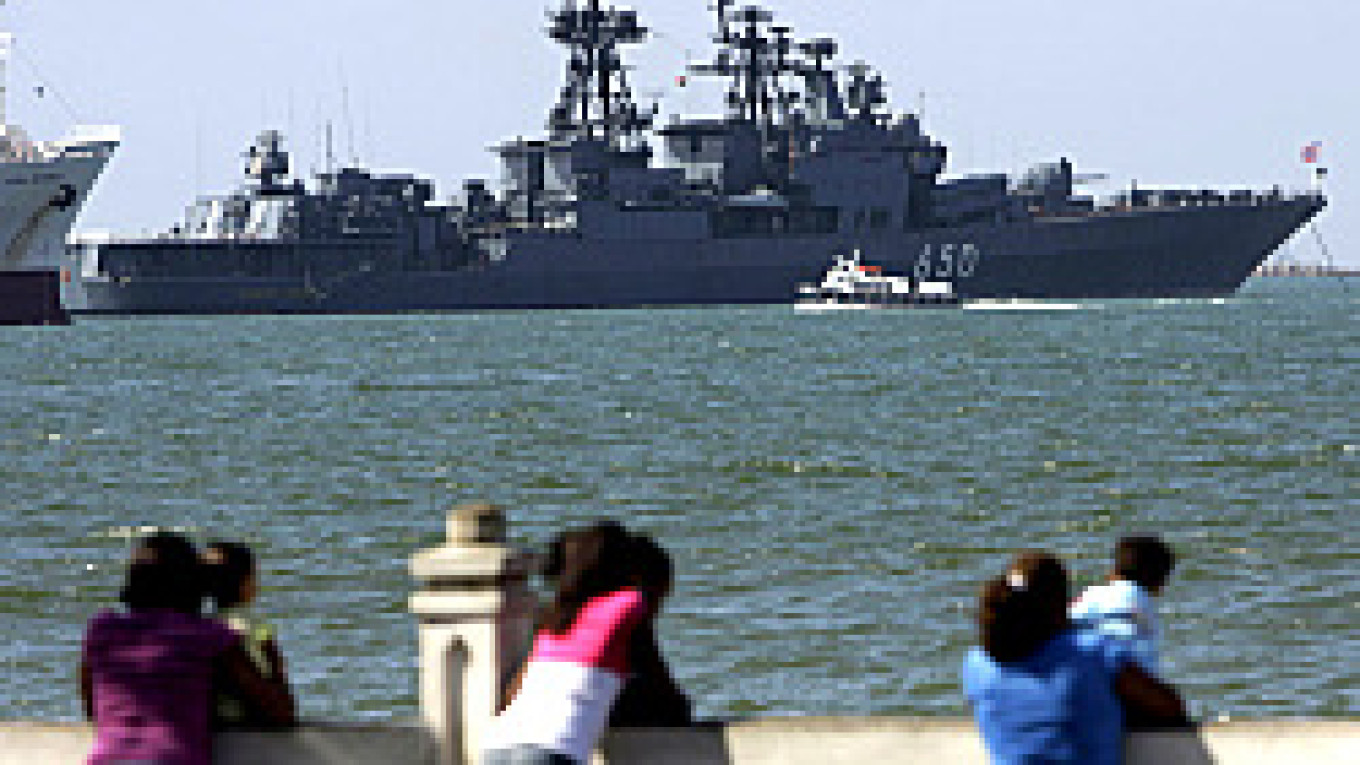The destroyer Admiral Chabanenko is the first Soviet or Russian warship to traverse the canal since World War II, as the canal was off limits to the Soviet Union during the Cold War.
The destroyer arrived Saturday at the former Rodman Naval Station, which the United States turned over to Panama nearly a decade ago along with control of the canal.
Vice Admiral Vladimir Korolev said the trip was aimed at showing "the Russian fleet's presence in the strategic areas of the world."
The voyage reflects Russia's growing influence in the region and anger with the United States for using warships to deliver aid to Georgia after its August war with Russia.
Panamanian Foreign Minister Samuel Lewis portrayed the Russian canal crossing as business as usual.
"Here there is no other message than that the canal is open to all of the world's ships," he said Friday.
Lewis said the canal maintained a neutral policy in world politics. He pointed out that the ship's passage came just a few days before U.S. Secretary of State Condoleezza Rice is scheduled to visit Panama.
The U.S. government handed over the Rodman Naval Station and the canal to Panama nearly a decade ago, and the waterway has since become a symbol of Panama's true independence.
When it opened in 1914, the canal was a symbol of the United States' growing global reach and became a major U.S. military outpost for generations. The 16-kilometer-wide, 80-kilometer-long strip along the canal was considered U.S. territory -- a fact that allowed Canal Zone native John McCain to run for the U.S. presidency this fall.
The Admiral Chabanenko entered the canal Friday night and took eight hours to reach the Pacific, where it docked at the former U.S. base.
The destroyer is among four ships, including the Peter the Great nuclear-powered cruiser, that comprised the first Russian Navy deployment to the Western Hemisphere since the Cold War. Before arriving at the canal, the fleet took part in joint exercises with Venezuela's navy.
Navy spokesman Igor Dygalo would not say Friday where the Peter the Great, which led the Russian squadron in the Caribbean maneuvers, would be located while the Admiral Chabanenko destroyer visited the Panama base.
He said the warships would head later this month to the Indian Ocean, where they are expected conduct joint maneuvers with the Indian navy.
Dygalo also said the Navy was sending its sole aircraft carrier and several accompanying ships for combat training in the Atlantic and the Mediterranean.
Dygalo said the Admiral Kuznetsov carrier, the Admiral Levchenko destroyer and two support ships sailed from the Northern Fleet's main base of Severomorsk, on the Barents Sea near Finland, on a tour that will last several months.
He said the ships would "perform tasks in line with combat training plans" and visit several ports.
Ocean tours by numerous ships from different fleets conducted at one time mark the most ambitious Russian Navy deployment since the Soviet times. The expanded presence contrasts sharply with the chaotic 1990s, when the Navy ships were stranded berth-side for lack of funds.
But military analysts say the Navy now remains only a shadow of what it was in the Soviet era.
A Message from The Moscow Times:
Dear readers,
We are facing unprecedented challenges. Russia's Prosecutor General's Office has designated The Moscow Times as an "undesirable" organization, criminalizing our work and putting our staff at risk of prosecution. This follows our earlier unjust labeling as a "foreign agent."
These actions are direct attempts to silence independent journalism in Russia. The authorities claim our work "discredits the decisions of the Russian leadership." We see things differently: we strive to provide accurate, unbiased reporting on Russia.
We, the journalists of The Moscow Times, refuse to be silenced. But to continue our work, we need your help.
Your support, no matter how small, makes a world of difference. If you can, please support us monthly starting from just $2. It's quick to set up, and every contribution makes a significant impact.
By supporting The Moscow Times, you're defending open, independent journalism in the face of repression. Thank you for standing with us.
Remind me later.


